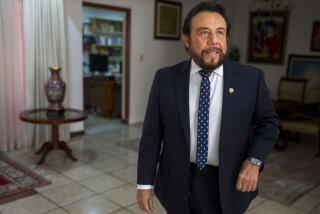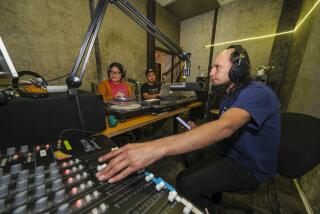Trying Hard to Ride the Tiger : Cristiani asks for more time in complex struggle with Salvador’s often autonomous army
- Share via
El Salvador’s President Alfredo Cristiani has finally admitted that he will not be able to keep his promise right away to purge his country’s army of all officers suspected of human rights abuses in the recent civil war. Thankfully, that has not stalled the peace process--at least so far. But given the heavy-handed role played by the armed forces in El Salvador’s recent history, it is still a very troubling precedent.
Cristiani confirmed to journalists last week that he has asked the United Nations, which sponsored last year’s Salvadoran peace negotiations and is now monitoring the peace process, for more time in which to dismiss or reassign approximately 100 allegedly abusive military men. Under the original peace agreement, those officers--who were singled out in a secret report to Cristiani by a civilian peace commission--were to have been cashiered by Dec. 31.
So far, however, only 23 officers have actually been fired, according to Salvadoran government sources. The others are still on active duty without formal assignments, but a handful continue to hold key government posts. They include the defense minister and his top deputy, both accused of trying to cover up the murder of six Jesuit priests by an army platoon in 1989.
Salvadoran government sources now say that Cristiani has asked U.N. Secretary General Boutros Boutros-Ghali for approval to keep both men in his government until Cristiani leaves office in mid-1994. That approval may be forthcoming, given the United Nations’ reluctance to interfere in internal Salvadoran affairs as long as the peace process is moving forward.
Cristiani’s decision to go slow may be politically realistic, given the influence that the military wields in right-wing political circles, among the areas to which Cristiani must look for support. And give Cristiani his due: He is one civilian leader who has so far been able to ride the back of El Salvador’s military tiger without being devoured. But even if he survives, what kind of a challenge will he leave his successor--who one hopes will also be a civilian non-puppet?
The military was a political power in El Salvador for 50 years before the civil war began. That is what helped make it such a corrupt, brutal institution that it could not win its civil war even with U.S. aid. To leave its officers with the sense that they can still push civilians around (or worse) with impunity would prove to be a tragic error--not only for the country but for the military Establishment itself.
More to Read
Sign up for Essential California
The most important California stories and recommendations in your inbox every morning.
You may occasionally receive promotional content from the Los Angeles Times.













